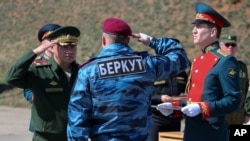LONDON —
The special police units blamed for the deadly shootings in Kyiv in February are, in part, a legacy of the country’s Soviet past.
Ukraine has several special police forces, including the Security Service and the Berkut riot police, both of which have been implicated in the Kyiv shootings.
Senior Fellow Igor Sutyagin at London’s Royal United Services Institute says he is not surprised that such forces have been mentioned and that several Berkut officers have been arrested. But he says early indications that most of the shooters were from Berkut are probably not accurate.
“I have some doubts whether it was exclusively Berkut, and whether it was mainly Berkut, because the radio communications intercepts show that there were Security Services snipers participating in that," he said. "Well, they were not alone, so there were probably, there might be Berkut snipers as well.”
Sutyagin says the Berkut forces were mainly on the streets while the security police were deployed to the upper floors of buildings around the main protest site in Maidan Square and along Instytutska Street. Most of those killed were reportedly hit with bullets fired from above.
The Berkut force was created in 1988, just three years before the Soviet Union fell. Independent Ukraine kept the force ostensibly as riot police, but Sutyagin says it became something else, in part because it answered to senior Interior Ministry officials, rather than police commanders.
“They were somehow sort of Praetorian Guards [body guards] for Ministry of Interior and maybe even for politicians. And they obeyed their orders," he said. "And so, it is not about, mainly not about Berkut itself. It is about orders which were issued for them to obey.”
He says it makes sense that the Berkut and other well-disciplined, top-level forces operated under orders from senior officials on that bloody February day, as the government has charged.
But Sutyagin also says that after two months on the freezing cold streets of Kyiv, the police officers were openly hostile toward the protesters, who also hated them. He says that contributed to the violence that killed more than 100 people, mostly protesters, and brought down a government.
The interim Ukrainian government's report implicates ousted president Viktor Yanukovych, and says Russian security service agents helped him plan and carry out the assault in mid-February. Yanukovych rejects the allegations. The Russian government has denied any involvement in the violence and blamed the deaths on the protesters
Ukraine has several special police forces, including the Security Service and the Berkut riot police, both of which have been implicated in the Kyiv shootings.
Senior Fellow Igor Sutyagin at London’s Royal United Services Institute says he is not surprised that such forces have been mentioned and that several Berkut officers have been arrested. But he says early indications that most of the shooters were from Berkut are probably not accurate.
“I have some doubts whether it was exclusively Berkut, and whether it was mainly Berkut, because the radio communications intercepts show that there were Security Services snipers participating in that," he said. "Well, they were not alone, so there were probably, there might be Berkut snipers as well.”
Sutyagin says the Berkut forces were mainly on the streets while the security police were deployed to the upper floors of buildings around the main protest site in Maidan Square and along Instytutska Street. Most of those killed were reportedly hit with bullets fired from above.
The Berkut force was created in 1988, just three years before the Soviet Union fell. Independent Ukraine kept the force ostensibly as riot police, but Sutyagin says it became something else, in part because it answered to senior Interior Ministry officials, rather than police commanders.
“They were somehow sort of Praetorian Guards [body guards] for Ministry of Interior and maybe even for politicians. And they obeyed their orders," he said. "And so, it is not about, mainly not about Berkut itself. It is about orders which were issued for them to obey.”
He says it makes sense that the Berkut and other well-disciplined, top-level forces operated under orders from senior officials on that bloody February day, as the government has charged.
But Sutyagin also says that after two months on the freezing cold streets of Kyiv, the police officers were openly hostile toward the protesters, who also hated them. He says that contributed to the violence that killed more than 100 people, mostly protesters, and brought down a government.
The interim Ukrainian government's report implicates ousted president Viktor Yanukovych, and says Russian security service agents helped him plan and carry out the assault in mid-February. Yanukovych rejects the allegations. The Russian government has denied any involvement in the violence and blamed the deaths on the protesters




